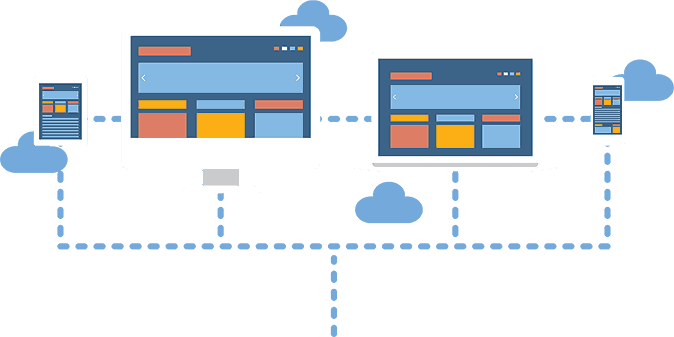Inventory management is one of the top 3 most important features to expect in an Enterprise Resource Planning (ERP) Software, according ERP Focus. This powerful tool impacts efficiency across a business, from sales, to back office accounting, to the warehouse floor. If you are new to ERP inventory management, this article will help you understand ERP stock software and how it works.
What is ERP Inventory Management?
ERP inventory management is a module within ERP software that provides real-time inventory data and streamlines inventory processes through automation. ERP is a type of software that helps businesses manage inventory, financials, planning, warehousing, logistics, operations and other critical functions.
“Many ERPs track the condition of those things too, recording factors such as temperature and humidity of the storage areas,” said the ERP Focus article. “Inventory includes the things ready for immediate sale and things that are still in production and will be ready for eventual sale and we call this category work in process. Another category is called raw materials and includes materials owned by the business that have yet to enter into any conversion processes.”
What does ERP Inventory Management Do?
Tracks and manages inventory
Integrates with purchase order and sales functions
Integrates with accounting, payroll, ecommerce, shipping and more
Manages storage and ERP stock transfers
Enables multi-channel order fulfillment and auto-fulfillment
Provides data insights and analytics
You may also be interested in ERP Integration: The Secret to More Powerful Apps
Benefits ERP Inventory Management
ERP inventor software can help minimize excess inventory, inventory shortages and dead stock while improving inventory turnover. Here’s how…
Data management and automation are necessary to keep pace in today’s business environment. ERP inventory management makes it easy to streamline inventory processes and gain deeper insight to drive strategic decision making. With the right ERP stock software, companies can more easily enable complex supply chains and inventory accounting models like “first in, first-out” and “Last in, First out”.
The top benefits of ERP inventory management include:
Inventory Tracking
Automation
Efficiency Gain
Lean Inventory
Reduce Costs
Related Reading: Keys to ERP Implementation Success
1. Inventory Tracking
ERP stock management software enables better inventory tracking. Since your ERP system can integrate with your other solutions like purchasing and ecommerce software across locations and departments, it is easy to maintain a single source of truth in real-time.
2. Automation
When they are new startups, manufacturers and other businesses may be able to get by with entry-level or homegrown inventory management systems, but as a business grows larger and more complex, more sophisticated integrations and automation become essential. ERP automation helps eliminate manual processes throughout the organization.
3. Efficiency Gain
With accurate, real-time data your accounting department will be empowered with renewed confidence. What’s more your warehouse team will spend less time hunting down missing inventory, while sales teams, field techs and decision makers will be truly informed to do their jobs better.
4. Lean Inventory
ERP inventory management helps businesses maintain lean inventory processes.With automation, integration and real time data, ERP stock management software sharpens processes like forecasting, restocking, and managing excess inventory.
5. ERP Reduces Costs
While the sticker price of ERP software can be high, it is a worthwhile investment. From avoiding inventory obsolescence and fulfilling orders with more efficiency, to reduced manual data entry and fewer errors, a scalable ERP stock management software is critical to maintaining inventory success and driving growth.
[vc_row][vc_column width=’1/4′][/vc_column][vc_column width=’1/2′]
Simplify Your Path to Secure Cloud

CyberlinkASP’s Virtual Desktop Hosting and Application Delivery Service provides secure, affordable, and scalable cloud hosting.
[/vc_column][vc_column width=’1/4′][/vc_column][/vc_row]
What Type Businesses Use ERP Inventory Management Systems
Though ERP was originally created for Manufacturing and Distribution businesses, almost any type of business can benefit from ERP stock management software.
The most common industries that use ERP for inventory include
Manufacturing
Wholesale and Distribution
Healthcare & Medical Supply
Construction & Contracting
Retail & Restaurant
Hospitality
Consumer Packaged Goods
If you are not sure if you need ERP, here are some questions to ask yourself:
Is this business growing or does it plan to expand the business?
Does the business require increasingly complex processes?
Is automation a growing necessity to handle growing data and workloads?
Does the business have too many errors or too much overstocking, understocking or missing inventory?
If you are answering yes to one or more of these questions, an ERP solution is probably right for your business.
Features of ERP Inventory Management
While there are many brands of ERP and each is its own flavor, there are a few standard features you can expect. These include…
Inventory management and tracking
Sales and purchase order management
Warehouse management and stock transfers
B2B eCommerce integration
Payment gateway integration
Dock-to-Stock tracking
Units-of-measure & conversion scalars
Material issuance controls
Lot and Serial Tracking
Consigned inventory management
Inventory controls and multi-location management
Material movement tracking and management
ERP Inventory Management in the Cloud
It is easier than ever to get ERP anywhere, anytime. Most ERP vendors are delivering their solutions as cloud-native Software-as-a-Service solutions now, but almost any ERP system can be hosted in a private cloud or through a managed service provider. All of these options provide remote access to ERP. Businesses will have to choose the model that best suits their needs.
Related: Managed Cloud Hosting… How It’s Good for Software Users and Providers

